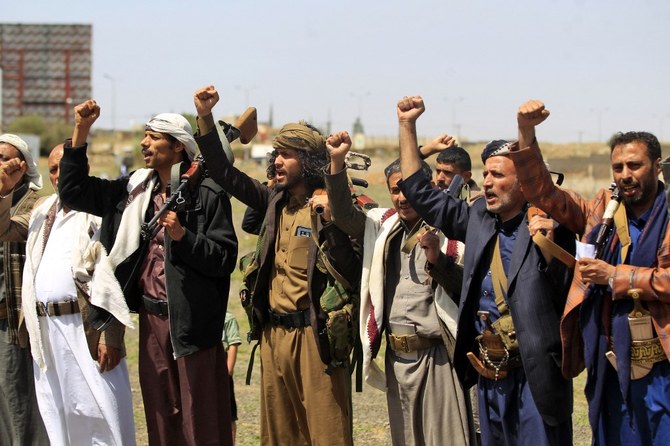CHICAGO: The Houthi militia has been the “primary obstacle to peace efforts” in Yemen, US Special Envoy Timothy A. Lenderking told a conference in Washington DC attended by Arab News on Monday.
Lenderking was joined by Mohammad Al-Amrani, a member of the Yemeni government’s negotiating team, who said the Houthis are not only backed by Iran but are following its strategy of using negotiations as a means to force concessions and make gains.
Lenderking and Al-Amrani were the opening speakers at the conference hosted by the Center for Conflict and Humanitarian Studies and the Arab Center Washington DC.
The Houthis’ recent losses “should indicate to them and to all the parties that there’s no military solution,” Lenderking said.
“We’ve also seen the Houthis threaten to strike international commercial airports and other targets in Abu Dhabi and Riyadh. This concerns the US and the international community greatly,” he added.
“The Houthis have pursued a dangerous pattern of increasingly obstructive and aggressive actions against Yemenis, Yemen’s neighbors and the entire international community, harming civilians and civilian infrastructure.”
Al-Amrani said the Houthis have “obstructed” every attempt at peace talks held in Kuwait, Geneva and Stockholm through “intransigence.”
The Houthis are “creating a generation … that believes that death is the message of life and that violence is the only solution to the Yemeni crisis,” he added.
“Iran … is trying to create mayhem in the region through different militias ... This is an issue. The affiliation of the Houthis to Iran is problematic.”
Al-Amrani said in many instances when it appeared that the Houthis might engage in constructive dialogue, the Iranians sent instructions to stop. The Houthis have been “trying to avoid any binding agreements,” he said.
“The peace process requires two parties that have the same determination to put an end to the conflict.” The Houthis “haven’t been a party” to peace efforts, Al-Amrani said.
Lenderking said the US is committed to “helping improve Yemeni lives, creating the space for Yemenis to collectively determine their own future and to advance a durable resolution that ends the conflict in Yemen.
“We’re not talking about a ceasefire here. We’re talking about ending the conflict and getting Yemen back on its feet. This remains a top US foreign policy priority.”
He added: “In terms of humanitarian assistance, the US has provided the people of Yemen more than $4 billion since the crisis began more than seven years ago.”
Lenderking said the US is “concerned with the UN’s estimated $3.9 billion funding gap in 2022,” and urged donors to “fulfil their pledges to the people of Yemen and to step up to give generously.”
Saudi Arabia is the world’s biggest donor of humanitarian aid to Yemen, having pledged more than $18 billion to the country over the past six years, according to the King Salman Humanitarian Aid and Relief Center.


























